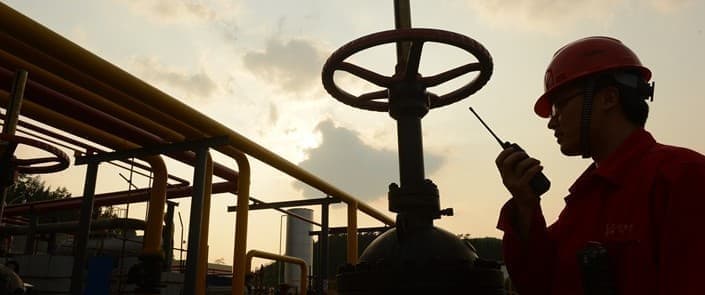“All oil-field workers are radiation workers.”
That quote comes from a blockbuster investigation by Justin Nobel writing in Rolling Stone, who has spent more than a year and a half researching and reporting on radioactivity in fracking waste.
When a well is drilled, it produces a ton of brine, a salty substance that comes out of the ground. Shale wells can produce as much as ten times more brine than they do oil and gas. While hydrocarbons prove to be useful, the brine needs to be hauled somewhere for disposal. Often it is reinjected into disposal wells, or, in some cases it is sent to water treatment plants.
The problem is that the brine can be radioactive. As Nobel writes in Rolling Stone, radioactive brine may be dramatically increasing the cancer risk for people who come in contact with it. The workers who handle the waste are most obviously at risk. But there are plenty of others. The brine is used for de-icing roads, so municipalities are essentially spreading radioactivity all over roads in various parts of the country.
Old oilfield equipment is also repurposed. Rolling Stone spoke with a Louisiana inspector who saw a child sitting on a fence that was so radioactive that someone might receive a full year’s radiation dose in a single hour. Related: Hydrogen Costs Could Be Set To Plunge By 50%
The oil and gas industry dismisses the risk of radioactivity in the brine, which is naturally occurring, as not something that anybody should be worrying about. However, some of the experts that Nobel interviewed argue otherwise. First of all, the notion that just because something exists naturally in the world somehow makes it benign, is odd. “Arsenic is completely natural, but you probably wouldn’t let me put arsenic in your school lunch,” one nuclear-forensics scientist told Rolling Stone.
Second, the industry is barley regulated, if at all, when it comes to handling radioactive substances. Officials at EPA and the Nuclear Regulatory Commission sounded perplexed when Nobel presented questions to them about the risk, each indicating that they were not responsible for regulating radioactivity in the oil and gas industry.
Nobel profiled several people who have come in contact with brine and have suffered from an array of worrying health problems. “The workers are going to be the canaries,” Raina Rippel of the Southwest Pennsylvania Environmental Health Project, told Rolling Stone. “The radioactivity issue is not something we have adequately unpacked. Our elected leaders and public-health officials don’t have the knowledge to convey we are safe.”
This is not just an environmental story or a public health story, but it could also be a financial one. This is a whole aspect of the oil and gas industry that is mostly unregulated, underreported and largely unknown to the public. And it could yet turn into a massive liability for the industry if local, state or the federal government ever decided to get serious about it.
The industry would be directly impacted if it had to pay for remediation somehow, or even if the standards on the disposal of toxic brine were tightened up. It could spell financial “disaster” for oil and gas drillers if the EPA began regulating brine as a hazardous waste, one legal scholar told Rolling Stone. Reckoning with the public health fallout from radiation is not something anybody seems willing to take on at the moment. Related: The “Twin Threats” Facing Big Oil
But as Rolling Stone notes, public awareness of the problem itself could be a big problem for the industry. Oil and gas is already starting to see its “social license to operate” erode over climate change concerns. But the threat from climate change is diffuse in both space and time. The damage from fossil fuels is somewhat abstract in that sense.
In contrast, the extraction of toxic radioactive waste from beneath the earth, and then spreading it on roads, for example, is arguably more menacing. Or, at the very least, the direct health threat to the public is easier to understand. Certain types of cancers are cropping up, and scientists say there is a lot of evidence that points in the direction of exposure to brine and proximity to other oil and gas processes.
It seems as if the unconventional oil and gas industry has been around forever, as if it’s a fact of life that everyone has to live with. But the story of fracking is only a little over a decade old, and with each passing year the science surrounding the health risks grows more damning. Some presidential candidates are already calling for a ban on fracking. As the evidence of radioactivity becomes more known, the momentum for a crackdown on the industry could continue to grow.
By Nick Cunningham of Oilprice.com
More Top Reads From Oilprice.com:
- Phase 1 Trade Deal Won’t Spark An Oil Export Boom
- China Finds Oil In Asia’s Deepest Onshore Well
- Is This The End For Big Oil Dividends?


















